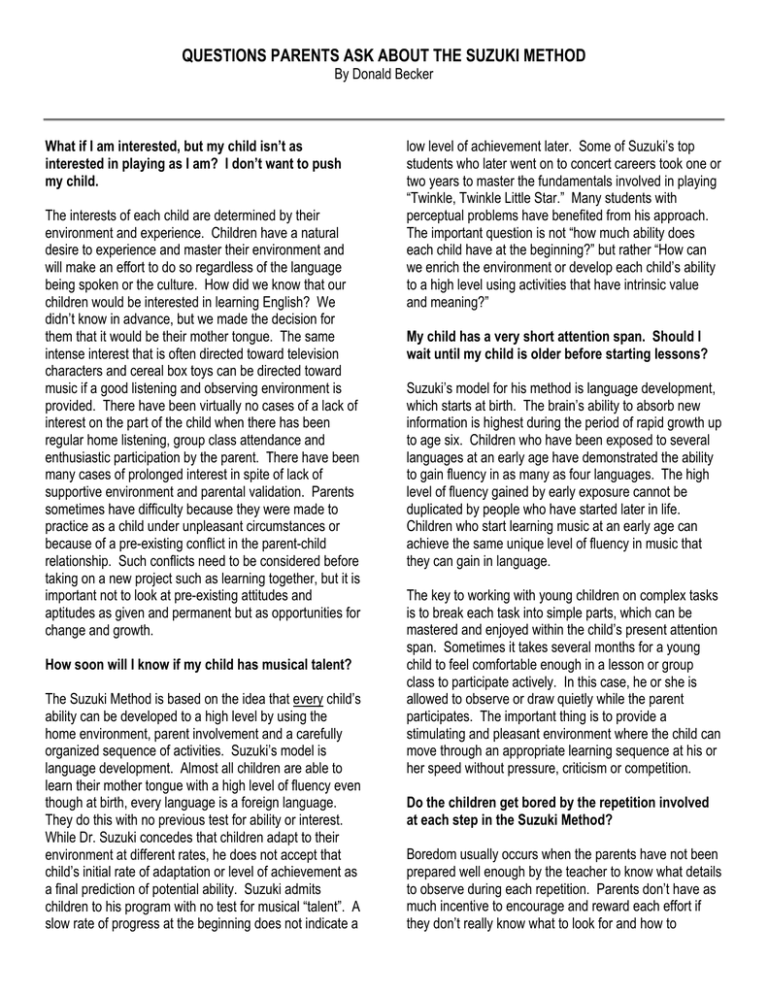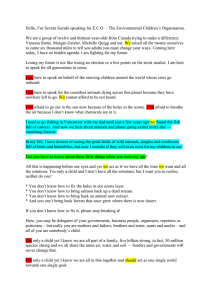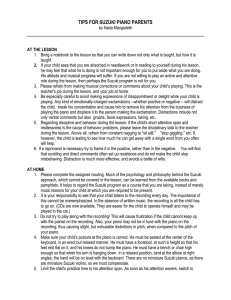QUESTIONS PARENTS ASK ABOUT THE SUZUKI METHOD
advertisement

QUESTIONS PARENTS ASK ABOUT THE SUZUKI METHOD By Donald Becker What if I am interested, but my child isn’t as interested in playing as I am? I don’t want to push my child. The interests of each child are determined by their environment and experience. Children have a natural desire to experience and master their environment and will make an effort to do so regardless of the language being spoken or the culture. How did we know that our children would be interested in learning English? We didn’t know in advance, but we made the decision for them that it would be their mother tongue. The same intense interest that is often directed toward television characters and cereal box toys can be directed toward music if a good listening and observing environment is provided. There have been virtually no cases of a lack of interest on the part of the child when there has been regular home listening, group class attendance and enthusiastic participation by the parent. There have been many cases of prolonged interest in spite of lack of supportive environment and parental validation. Parents sometimes have difficulty because they were made to practice as a child under unpleasant circumstances or because of a pre-existing conflict in the parent-child relationship. Such conflicts need to be considered before taking on a new project such as learning together, but it is important not to look at pre-existing attitudes and aptitudes as given and permanent but as opportunities for change and growth. How soon will I know if my child has musical talent? The Suzuki Method is based on the idea that every child’s ability can be developed to a high level by using the home environment, parent involvement and a carefully organized sequence of activities. Suzuki’s model is language development. Almost all children are able to learn their mother tongue with a high level of fluency even though at birth, every language is a foreign language. They do this with no previous test for ability or interest. While Dr. Suzuki concedes that children adapt to their environment at different rates, he does not accept that child’s initial rate of adaptation or level of achievement as a final prediction of potential ability. Suzuki admits children to his program with no test for musical “talent”. A slow rate of progress at the beginning does not indicate a low level of achievement later. Some of Suzuki’s top students who later went on to concert careers took one or two years to master the fundamentals involved in playing “Twinkle, Twinkle Little Star.” Many students with perceptual problems have benefited from his approach. The important question is not “how much ability does each child have at the beginning?” but rather “How can we enrich the environment or develop each child’s ability to a high level using activities that have intrinsic value and meaning?” My child has a very short attention span. Should I wait until my child is older before starting lessons? Suzuki’s model for his method is language development, which starts at birth. The brain’s ability to absorb new information is highest during the period of rapid growth up to age six. Children who have been exposed to several languages at an early age have demonstrated the ability to gain fluency in as many as four languages. The high level of fluency gained by early exposure cannot be duplicated by people who have started later in life. Children who start learning music at an early age can achieve the same unique level of fluency in music that they can gain in language. The key to working with young children on complex tasks is to break each task into simple parts, which can be mastered and enjoyed within the child’s present attention span. Sometimes it takes several months for a young child to feel comfortable enough in a lesson or group class to participate actively. In this case, he or she is allowed to observe or draw quietly while the parent participates. The important thing is to provide a stimulating and pleasant environment where the child can move through an appropriate learning sequence at his or her speed without pressure, criticism or competition. Do the children get bored by the repetition involved at each step in the Suzuki Method? Boredom usually occurs when the parents have not been prepared well enough by the teacher to know what details to observe during each repetition. Parents don’t have as much incentive to encourage and reward each effort if they don’t really know what to look for and how to measure small steps of progress. In order to gain the necessary insight into the use of repetition for mastery at each step, each parent needs to use the same approach in their own learning of the basic skills because then they can have more chance to develop the analytical skills and ability to accept mistakes that they can use with their child. When using repetition to achieve mastery at each step, it is important to choose an activity which the child is capable of completing with reasonable success so that attention can be focused on improvement and attention to detail. Children who spend their practice time and lesson time making an already successful effort even better develop good playing habits, a lot of self-confidence, and a positive self-image. Children who learn too many pieces too fast (as a result of anxiety or fear of boredom on the part of the parent or teacher) tend to play insecurely and develop a fear of performing. By going on to the next piece before mastery is achieved on earlier pieces, these children are practicing for failure instead of success. Repetition for mastery at each step develops basic learning skills, attitudes and philosophy that can be applied successfully in other areas. How much should we practice? Suzuki says that it is not necessary to practice every day, just on the days when you eat. At the beginning, it is important to have very short practice sessions since the child doesn’t have very many activities to work on and his or her attention span has not been developed. Later, as the child gains more skills and a longer attention span, the practice sessions can be extended to fifteen minutes or half an hour. It is important to practice only as long as parent and child can work together in a pleasant learning atmosphere without getting too tired to enjoy the experience. The parents need to keep checking with the child using questions like, “Are you getting tired or shall we play some more?” If the parent can ask this question even when he or she is reasonably certain that the child still wants to go on, this gives the child confidence in the parent’s respect for his or her needs. The challenge is to end the practice session on a successful effort when the child still wants to continue, regardless of how much the parent thinks should have been accomplished. Why is a regular group playing session necessary? Young children have rapidly changing interests. In order to nurture and develop interest in one thing, they need repeated exposure and encouragement. A group class gives each child regular opportunity to see other children and adults enjoying the same skills that he or she will be learning. When a child has a chance to passively preview skills before actively attempting them, he or she gains more confidence. In addition to the social skills that children can gain at group class, they gain the ability to play together in a musical ensemble. This is a separate skill from solo playing all together. Parents often feel reassured when they talk to a more experienced parent whose child plays very well and find out that it wasn’t always as easy as it looks now. The importance of group lessons cannot be overemphasized. While the actual teaching takes place in the individual teaching studios, group lessons provide reinforcement for skills, aid in review, increase a student’s listening time, and at the same time provide the student with fun and sociability. At early levels, “games” are a vehicle of teaching many techniques. At later levels, these “games” are succeeded by a more straightforward teaching. While some techniques at the beginning stages can be most easily taught in a group situation, attendance at group lessons is important at all levels.




